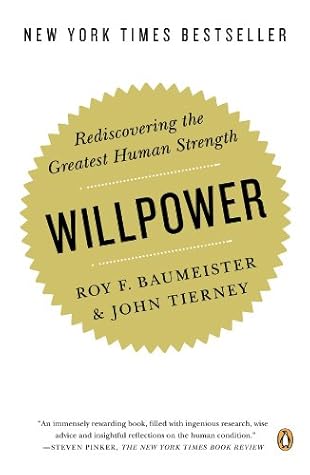More on this book
Community
Kindle Notes & Highlights
Read between
May 22 - July 5, 2016
Until adolescents’ self-control catches up with their impulses, parents have the thankless task of somehow providing strict external control while at the same time starting to treat the child as something closer to a grown-up.
The more that children are being monitored, the more opportunities they have to build their self-control.
As they strengthen their willpower, children also need to learn when not to rely on it.
We don’t want to join the generalized TV bashing, because we’ve seen children learn lots of useful things from television. But one thing they don’t learn is how to control their attention.
The self-esteem movement, fortunately, never took hold in the video game industry, probably because children would have been too bored by games that began by telling them what great players they were.
While parents and educators have been promoting the everybody-gets-a-trophy philosophy, children have been seeking games with more demanding standards.
Instead of bemoaning the games’ hold over children, we should be exploiting the techniques that game designers have developed. They’ve refined the basic steps of self-control: setting clear and attainable goals, giving instantaneous feedback, and offering enough encouragement for people to keep practicing and improving.
The first step in self-control is to establish realistic goals.
They’re trapped in a nutritional catch-22: 1. In order not to eat, a dieter needs willpower. 2. In order to have willpower, a dieter needs to eat.
The more carefully and frequently you monitor yourself, the better you’ll control yourself.
It takes willpower to turn down dessert, but apparently it’s less stressful on the mind to say Later rather than Never.
people with good self-control mainly use it not for rescue in emergencies but rather to develop effective habits and routines in school and at work.
Your supply of willpower is limited, and you use the same resource for many different things.
the best way to reduce stress in your life is to stop screwing up, but when you’re depleted you’re liable to make mistakes that will leave you with more bills to pay, more relationship damage to repair, more pounds to lose. Beware of making binding decisions when your energy is down, because you’ll tend to favor options with short-term gains and delayed costs.
Get some healthy food into your body, wait half an hour, and then the decision won’t seem so overwhelming.
Aiming for huge and quick transformations will backfire if they seem impossible.
“We simply ask our managers and other workers to set their top goals for the week,” Patzer says. “You can’t have more than three goals, and it’s fine if you have less than three. Each week we go over what we did last week and whether we met those goals or not, and then each person sets the top three goals for this week. If you only get goals one and two done, but not three, that’s fine, but you can’t go off working on other goals until you’ve done the top three.
resolve to start your day with ninety minutes devoted to your most important goal, with no interruptions from e-mail or phone calls,
One of the most common reasons for the self-control problem is overconfidence in willpower.
We assume we’ll magically have more free time in the future than we do today. So we say yes to a work commitment three months from now that we’d never accept if it were next week—and then discover too late that we still don’t have any time for it.
People with stronger willpower are more altruistic.


